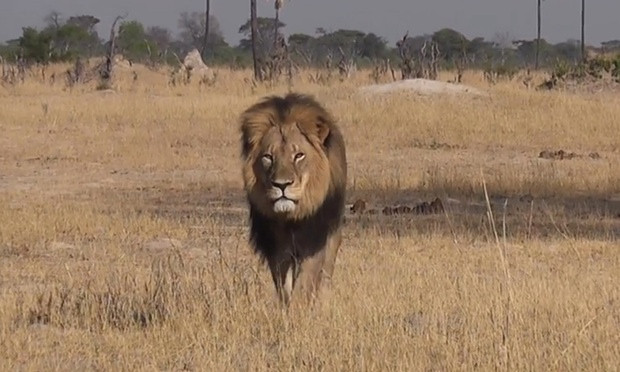Cecil the lion: Inside the big game hunting industry where shooting a lion starts at $50,000

On the website of African Hunting Safari Consultants a price list sits above a dozen photos of white men with guns standing over the corpses of lions in the African Savannah. A trip costs just under $50,000 for ten days spent stalking a majestic big cat and then blowing it away.
The company offers trips to Tanzania, South Africa and Zimbabwe, where US dentist Walter Palmer sparked worldwide condemnation when he killed a well-known lion named Cecil just outside the wildlife park where he lived. The firm – which did not respond to requests for comment by IBTimes UK – will even stuff and then ship your kill home for you.
"There are plenty of outfitters offering various types of hunting but nobody until now is offering the complete service of organising the hunting, taxidermy and trophy shipment," it boasts. They also offer zebras, elephants and long-horn deer.
The suggestion that trophy hunting plays a significant role in African economic development is misguided.
Big game hunting is big business. While figures for countries such as Tanzania and Zimbabwe are hard to come by, the industry in South Africa is worth more than US$500m (£320m, €450m) per year, with more than 9,000 foreign hunters visiting the country in 2012 according to a study that year by the University of the North West in South Africa and quoted by CNBC.
Across the industry the hunters are almost entirely foreigners from America and Europe, with between 46% and 62% of lion trophies being imported into the US according to a 2013 report which also claimed that agents, hunting operators – known as "outfitters" – and professional hunters were also almost entirely foreign.
And it is not just lions, tour operators offer a range of kills. On the concise website of a British-based hunting operator, a detailed price list includes everything from elephants and lions to warthogs and Thomson's gazelles. It also lists a range of guns, from .308 Winchester rifle up to .458 and .416 Rigby rifles for hunting dangerous game.
Hunt in Europe, a hunting outfit based in Serbia, has even more reasonable rates. Bagging a lion in the African savanna will set you back a princely $20,000, a zebra is just under $600 while a gazelle is a far more reasonably $220. You can kill birds, meanwhile, for $6 per piece. Hunt in Europe did not reply to emailed requests for comments by IBTimes UK.
It is argued by pro-hunting groups that organised hunts actually benefit rural communities in Africa that would otherwise have no source of income, and an often quoted figure is that trophy hunting brings in US$200m per year to remote areas of Africa. But a 2013 report by a group of anti-hunting NGOs claimed that this was a myth.
"The suggestion that trophy hunting plays a significant role in African economic development is misguided," said economist Rod Campbell, lead author of the study. "Revenues constitute only a fraction of a percent of GDP and almost none of that ever reaches rural communities."
It found that as a portion of any national economy, trophy hunting revenue never accounted for more than 0.27% of GDP while trophy hunting revenues only accounted for 1.8% of overall tourism in the nine countries that it surveyed. Rather, most of the cash went into the pockets of international hunting outfits or local governments.
"Non-consumptive nature tourism – like wildlife viewing and photo safaris – is a much greater contributor than trophy hunting to both conservation and the economy in Africa. If trophy hunting and other threats continue depleting Africa's wildlife, then Africa's wildlife tourism will disappear. That is the real economic threat to the countries of Africa," Jeff Flocken, American regional director, International Fund for Animal Welfare, said in the report.
Pro-hunting advocates argue that not only is the industry good for local populations but they are good for the animals too. Hermann Meyeridricks, president of the Professional Hunters Association of South Africa told CNBC Africa in an interview this year that the sustainable trophy hunting of animals such as elephants and rhinos contributes to their conservation.
"We have to look at managing elephants in a sensible and economically sustainable manner and trophy hunting certainly is. It has a low impact, as you take out selected bulls that are past their breeding time and the money generated by that is considerable," he said.
But applying that argument to Africa's lion population is contentious. While lions are not endangered and are indeed often bred for hunting in Africa, conservationists dispute that hunting them has any positive affect on their numbers.
The same report found that the number of African lions has declined by more than 50% in the past three decades, with 32,000 or fewer believed remaining today. It further found that the declines are steepest in the African countries that have the heaviest hunting, suggesting a direct correlation between big game hunting and the reduction in numbers of wildlife.
"Trophy hunting is driving the African lion closer to extinction," said Teresa Telecky, director, wildlife department, Humane Society International.
"More than 560 wild lions are killed every year in Africa by international trophy hunters. An overwhelming 62% of trophies from these kills are imported into the US."
© Copyright IBTimes 2025. All rights reserved.






















